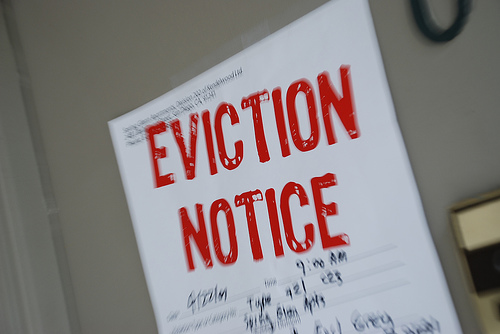Check out the story below about the Organizing and Policy Department, from UHAB’s Fall News Update. Read more about the work that UHAB is doing here.
Black mold spatters the walls like a Jackson Pollock painting. Water spills from cracks in the ceiling. The halls are covered with peeling lead paint. Roaches and mice feel safe and protected here. But the tenants of 1058 Southern Boulevard do not. Many of these tenants have called this 55-unit building in Hunts Point home for decades. And for years it remained a relatively decent and affordable place to live. But a new landlord acquired the building and began allowing it to fall into shameful disrepair.
As the tenants’ suffering grew, so did their outrage. In late 2012, they reached out to UHAB’s Organizing and Policy Department for help. In January, tenants filed for a 7A action. If successful, this could result in removing the building from the landlord’s control and placing it with a tenant-and-city approved manager. In March, UHAB Organizers assisted in making the landlord aware of the filing, working with tenants to deliver an “EVICTION” notice to their landlord.
Following this event, organized tenants began to feel harassed by their management company. Intimidation has included threats of eviction, unlawful refusal to renew leases, and summons to housing court. UHAB stood with the rent-striking tenants, many of whom are facing non-payment cases, as they delivered called on the Bronx Housing Court to stop siding with landlords and hear their plight.
“She harasses us, threatening eviction if we continue to work with HPD and other entities to improve conditions in our homes,” says longtime tenant Lisa Ortega. In April, the Tenants’ Association, UHAB organizers and other allies rallied outside Bronx Housing Court to demand the landlord, Miriam Shasho, immediately cease in the myriad of trumped up cases brought against residents. Tenants are now being supported by their Councilmember, Maria del Carmen Arroyo, as well as the Urban Justice Center.
“We have been brought to court over and over again,” says Lisa Ortega. “Our building is in terrible condition and we desperately need repairs. We didn’t have heat or hot water all winter.”
After the second organized action, the tenants offered tours of their neglected building to HPD and Sovereign Bank (the lender). The management company was pushed to provide a building super. They did so grudgingly, saying superintendent services would only be available “during normal business hours.”
HPD has rejected this halfstep. They have asserted that the management company must provide 24-hour superintendent services, and they must do so quickly.
“In the long run, we would like to see the tenants have a larger role in the decisions made about their housing – either though the mutual housing model or as a limited equity cooperative,” says Cea Weaver,
UHAB’s Assistant Director of Organizing and Policy. “This building is not in foreclosure, so a preservation plan that includes new ownership may be a long way off, but the tenants’ association is fierce and determined.
“At the heart of everything we do is UHAB’s philosophy of resident choice – that tenants have an inherent right to assert their collective vision about how their home should look and feel. All tenants have a right to safe and affordable housing, and we believe that residents themselves are much more equipped to protect this right than absentee landlords and predatory equity companies.”


